#best crm for sales reps
Text
Automate Your Sales Process with CRM: A Comprehensive Guide
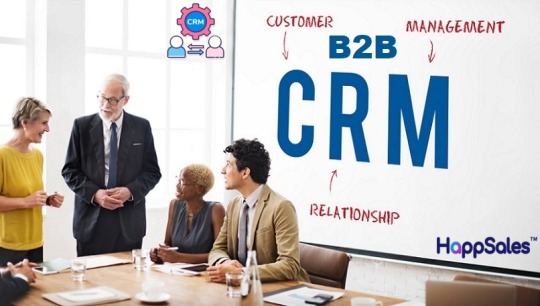
In the fast-paced world of sales, efficiency is key. Sales automation Customer Relationship Management (CRM) systems are powerful tools that can streamline your sales process, improve productivity, and boost revenue. In this guide, we’ll explore what sales automation CRM is, its benefits, and how you can implement it in your business.
What is Sales Automation CRM?
Sales automation CRM is a software solution that helps businesses automate their sales processes, from lead generation to closing deals. It combines customer relationship management (CRM) with automation tools to streamline tasks such as lead scoring, email marketing, and pipeline management. By automating these repetitive tasks, sales teams can focus more on building relationships with prospects and closing deals.
Benefits of Sales Automation CRM
Improved Efficiency: Sales automation CRM eliminates manual tasks, such as data entry and lead tracking, saving your team valuable time and allowing them to focus on selling.
Better Lead Management: With sales automation CRM, you can easily track and prioritize leads based on their likelihood to convert, ensuring that your team is focusing on the most promising opportunities.
Increased Sales Productivity: By automating repetitive tasks, your sales team can be more productive, allowing them to handle more leads and close more deals.
Enhanced Customer Relationships: Sales automation CRM allows you to personalize your interactions with customers, leading to stronger relationships and increased customer loyalty.
Improved Sales Forecasting: By tracking sales data and performance metrics, sales automation CRM can help you make more accurate sales forecasts, allowing you to better plan for the future.
Implementing Sales Automation CRM
Identify Your Needs: Before implementing a sales automation CRM, identify your specific needs and goals. Determine which processes you want to automate and what features are essential for your business.
Choose the Right CRM: There are many sales automation CRM systems available, so it’s essential to choose one that aligns with your business requirements. Look for a CRM that offers the features you need, such as lead management, email automation, and reporting tools.
Integrate with Existing Systems: If you already use other software systems, such as marketing automation or customer support software, ensure that your sales automation CRM can integrate with them seamlessly. This will help you streamline your processes and improve efficiency.
Train Your Team: Once you’ve chosen a sales automation CRM, provide training to your team to ensure they understand how to use the new system effectively. This will help them adapt to the changes quickly and maximize the benefits of the CRM.
Monitor and Optimize: Regularly monitor your sales automation CRM’s performance and gather feedback from your team. Use this information to optimize your processes and make improvements where necessary.
Conclusion
Sales automation CRM is a powerful tool that can help businesses streamline their sales processes, improve efficiency, and boost revenue. By automating repetitive tasks, such as lead tracking and email marketing, sales teams can focus more on building relationships with prospects and closing deals. Implementing a sales automation CRM requires careful planning and consideration, but the benefits are well worth the effort. With the right CRM in place, your sales team can achieve new levels of success and drive your business forward.
Original Source: Sales Productivity
#b2b crm software#best crm for sales reps#Sales Productivity#sales automation crm#sales pipeline crm#crm for sales team#b2b sales tools
0 notes
Text
Finding the Best CRM for Accountants and Accounting Firms
For accountants and accounting firms, time is money. Juggling client communication, document management, and tax preparation tasks can leave little room for error. Streamlining processes and enhancing client relationships are crucial for success. This is where the Best CRM for Accounting Firms system specifically designed for accountants can be a game-changer.

Read Blog: CRM For Service Industry
Why a CRM for Accountants?
Traditional CRMs might not cater to the specific needs of accounting professionals. An accounting-focused CRM offers features that directly address your workflows:
Centralized Client Management: Store all client information, tax documents, and financial data in one secure location. Eliminate the hassle of searching through scattered spreadsheets and emails.
Automated Workflows: Automate repetitive tasks like sending invoices, appointment reminders, and follow-up emails. Free up valuable time for strategic client communication and analysis.
Enhanced Collaboration: Foster seamless collaboration within your team. Share client information, track project progress, and ensure everyone is on the same page.
Improved Client Communication: Maintain clear and consistent communication with clients through secure messaging, document-sharing capabilities, and online portals.
Powerful Reporting and Analytics: Gain valuable insights into client performance, identify potential growth areas, and track key performance indicators (KPIs).
Read More: Best Lead Management Software
Choosing the Right Fit: Key Considerations
With a plethora of accounting-specific CRMs available, selecting the best option requires careful consideration:
Features & Functionality: Identify your specific needs. Do you prioritize client portal access, automated tax filing workflows, or integration with your existing accounting software? Choose a CRM that offers the features you'll use most.
Ease of Use: Look for a user-friendly interface that can be easily adopted by your entire team, regardless of technical expertise.
Scalability: Consider your firm's size and projected growth. Choose a CRM that can scale with your needs and accommodate future expansion.
Security and Compliance: Client data security is paramount. Ensure the CRM offers robust security features and complies with relevant data privacy regulations.
Integrations: Does the CRM integrate seamlessly with your existing accounting software, tax preparation tools, or other platforms you use? Seamless integration creates a central hub for all your data.
Budget: Accounting-specific CRMs might have different pricing structures. Consider your budget and the features offered by each option.
Read More: Best Healthcare CRM Software
Top Contenders: Exploring Accounting CRM Options
Here are some popular accounting-specific CRMs to consider:
Karbon: Offers a comprehensive package with features like client portals, practice management tools, and robust reporting functionalities.
ConvergeHub: This high-end CRM excels at financial tracking and integrates seamlessly with QuickBooks.
HubSpot CRM: The free tier provides basic features like lead management and contact management, making it a good option for startups or smaller firms.
SalesTown CRM: A highly customizable platform with a wide range of features, including lead management, sales automation, and project management tools.
Freshsales: Focuses on lead capture and nurturing, with features specifically designed to convert leads into paying clients.
Read blog: Travel agency crm
Beyond the Big Names:
While established players dominate the market, keep an eye on innovative solutions from emerging companies. These might offer specialized features for specific accounting niches or provide better value for your budget.
Pro Tip: Many accounting CRMs offer free trials or demos. Take advantage of these to test-drive the software and assess its capabilities, user interface, and suitability for your team.
Read blog: CRM Portals
The Takeaway:
Implementing the best CRM for your accounting firm can revolutionize the way you manage client relationships, automate workflows, and enhance overall efficiency. By understanding your specific needs, evaluating available features, and exploring trial options, you can choose a CRM that empowers your firm to thrive in today's competitive landscape.
Remember, the "best" CRM isn't a one-size-fits-all solution. Focus on finding the platform that seamlessly integrates with your existing workflows and empowers your team to deliver exceptional accounting services to your clients.
Other blog: Project Management CRM
#sales crm#sales crm software#best sales crm#sales crm tools#sales crm systems#crm for sales reps#sales crm tool
0 notes
Text
The Ultimate Guide to the Best CRM Solutions for Every Industry | SalesTown
Introduction:
In the ever-evolving landscape of business, Customer Relationship Management (CRM) tools have become indispensable for organizations across various industries. Whether you're a small business owner, a real estate professional, or a player in the travel and hospitality sector, finding the right Sales CRM solution is crucial. In this blog, we'll delve into the world of SalesTown CRM and explore why it stands out as the go-to choice for businesses seeking the best B2B CRM, small business CRM, real estate CRM, and CRM for the travel industry and hotels.
SalesTown CRM Overview
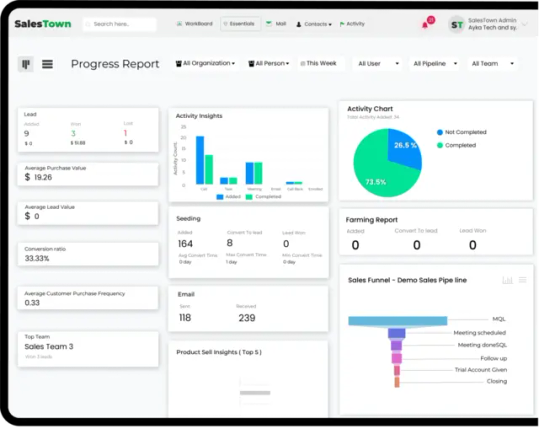
SalesTown CRM has positioned itself as a comprehensive CRM solution designed to cater to the diverse needs of businesses. Its robust features and user-friendly interface make it a top choice for B2B, small businesses, real estate professionals, and players in the travel and hospitality sector.
Best B2B CRM:
For B2B enterprises, a best b2b crm must facilitate seamless communication, efficient lead management, and streamlined sales processes. SalesTown CRM excels in these areas, offering a centralized platform that enhances collaboration among team members, automates repetitive tasks, and provides insightful analytics to drive strategic decision-making.
Best CRM for Small Business:
Small businesses require a best crm small business that scales with their growth and adapts to their unique needs. SalesTown CRM understands the challenges faced by small enterprises and offers customizable features, cost-effective plans, and an intuitive interface. It empowers small business owners to manage contacts, track sales, and nurture customer relationships with ease.
Best CRM for Real Estate:
Real estate professionals operate in a dynamic environment that demands efficient property management and effective client communication. SalesTown best crm real estate is equipped with tools for lead tracking, property listing management, and client engagement. It simplifies the complex processes of real estate transactions, ensuring a seamless experience for both agents and clients.
CRM for Travel Industry:
In the travel industry, customer satisfaction is paramount. SalesTown crm for travel industry recognizes this and provides features tailored to the unique needs of travel agencies. From managing customer inquiries and bookings to tracking travel itineraries and post-trip follow-ups, SalesTown CRM streamlines processes, allowing travel businesses to deliver exceptional customer experiences.
Best CRM for Hotels:
Hotels rely on positive guest experiences for repeat business. SalesTown best crm for hotels is designed to enhance guest relations by centralizing reservation management, automating check-in processes, and facilitating personalized communication. It empowers hoteliers to provide a seamless and memorable stay for their guests.
Conclusion
In the crowded landscape of CRM solutions, SalesTown CRM stands out as a versatile and powerful platform that caters to the unique needs of B2B enterprises, small businesses, real estate professionals, and players in the travel and hospitality industry. Its commitment to providing tailored solutions and user-friendly features makes it a top choice for businesses looking to elevate their customer relationship management strategies. Whether you're aiming for growth, efficiency, or exceptional customer experiences, SalesTown CRM is your trusted partner in navigating the path to success.
#sales crm#sales crm software#best sales crm#sales crm tools#sales crm systems#crm for sales reps#sales crm tool
0 notes
Text
How Banking CRM Improves Onboarding TAT in the Banking Sector
When it comes to the customer onboarding process Banking CRM has an important role to play in the banking sector.
Improving the customer experience is a priority, as customers only want to experience the best quality services. Therefore, onboarding TAT is quite an important parameter for banks.
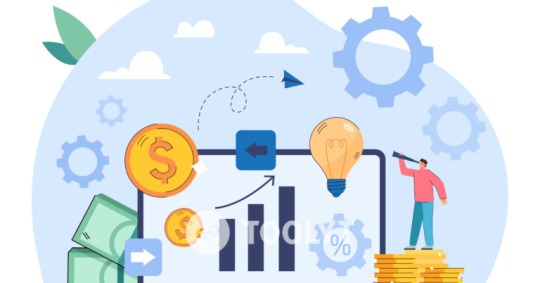
Why is customer onboarding TAT vital for banks?
With the help of banking CRM, banks can actually improve efficiency, response time, and eliminate all the manual processes along the way. This will not only improve the customer experience but also cause an increment in conversion rates.
How does Banking CRM help reduce the onboarding turnaround time?
Customer onboarding is often a time-consuming process that includes customer visits, a credit analysis process and heavy use of documentation. This is where a banking CRM plays a vital role in reducing the turnaround time for banks. Banking CRM digitalizes all manual processes with automated workflows and solutions.
Five crucial benefits of having a Banking CRM:
An automated lead management process can guide the banks with, lead capture, lead scoring, lead qualification, lead allocation and closing the deals. When you don’t have a proper lead CRM in place, you risk a lower return on investment, a leaky sales funnel, and strained relationships with leads and customers.
2. Real-Time Sales Tracking
With this feature, the sales managers could monitor the performance of the sales reps to ensure they are making the most of their time in the field, keeping them organized and productive.
Instant alerts and real-time tracking can guide the team to better manage sales agents’ time and set their daily schedules to improve their productivity in no time.
3. Automating the Underwriting Process
Banking CRM can guide the credit analysis process via streamlining the entire journey, for instance, by providing the platform to upload all the required documents digitally.
Automating the KYC, De-dupe, CDD (Customer due diligence), BL (Black List), and CIBIL score checks can save a lot of time for the credit managers when visiting for Personal Discussions (PD).
5. Customer Experience
Keeping the consumer happy is the only sustainable way to build a business and improve the customer experience with easy and straightforward navigation.

It includes not just data collection and the acceptance of an inescapable administrative burden, but also an understanding of the prospect’s needs. The digital workflow allows the process to be adjusted to the consumers’ demands and tastes.
Orginal source: How Banking CRM Improves Onboarding TAT in the Banking Sector - Toolyt
2 notes
·
View notes
Text
SMS Services | Quick Sms Turkey
PROMOTIONAL SMS
For any business, sales of products or services are the primary objective. And promotions for such deals are crucial for sustaining and succeeding in any industry. With most of the businesses now transformed from brick and mortar to digital, it has become essential for promotional bulk SMS to reach people instantly to boost the sales of products and services. It is now one of the critical marketing strategies followed by businesses worldwide from conglomerates to local small companies. Tawaab SMS Service provides profound promotional bulk SMS services to all clients at affordable costs.
Unlike transactional SMS, which is only for informational purposes and not for marketing, the sole promotional purpose of promotional bulk SMS is to market products and services. It may be in the form of offers, discounts, promotions, and others in detail to lure the customers into taking a call of action. All existing customers or new potential customers can receive these promotional messages. But the promotional messages may or may not be solicited by the recipients.
Tawaab SMS Services uses the latest technologies for providing many new and innovative promotional techniques available to its customers. With such unique and personalized promotional SMS, the customers can reach their targeted revenue as fast as possible. It gives a flexible platform for all customers in many sectors like e-commerce, banking, education, healthcare, logistics, and many more.
The mass marketing campaign for a mammoth target population is easily possible with Tawaab promotional bulk SMS services. It helps the existing target audience of the customers to be in constant contact with them for improving sales and future development. Any new product launch, or offer or discount, or coupons and many such lucrative approaches can lure the existing and new target audience to utilize the customer’s service and buy their products.
Since promotional bulk SMS reaches a massive target audience instantly, they are much cheaper than the TV, newspaper, and other advertisements now. Moreover, with most of the people now have their smartphones in their hands; it is easy and fast to take a call of action immediately. Quicker SMS service offers promotional bulk SMS services only at affordable costs with fast reach to a massive target audience. But it never compromises in quality for competitive pricing but only increases their innovative promotional approach for customers to benefit more.
PURCHEGE NOW
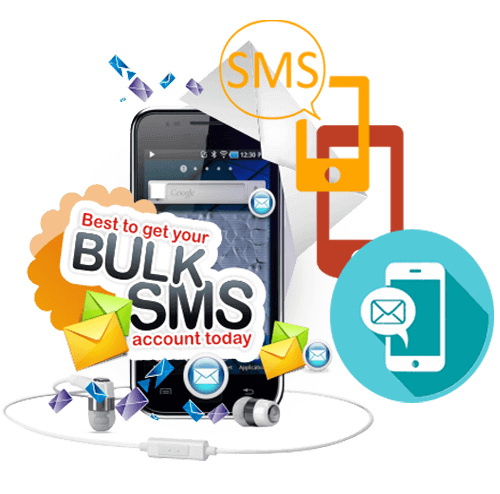

PROMOTIONAL Bulk SMS
Promotional SMS Services provides innovative promotional bulk SMS content that is cost-effective, assured deliverability, and also with convenient techniques to enhance the target audience to take action immediately. With maximum view rates than any other form of advertising, these bulk SMS is now a boon to e-commerce which is fast overtaking the retail business industry. It provides many types of promotional bulk SMS to any new product or service launches, offers, discounts, and others in many kinds including
Long code
Audio & video short URL
Web short URL
Missed call service
Promotional bulk SMS engages vast target audience in the best way possible to keep them in constant bonding with customers and their business operations. Also, Quickrs SMS Service could create effective brand loyalty, product marketing, and event publicity. It is feasible for any business to drive traffic to stores or conversions for increasing sales. Moreover, it could increase the number of attendees to events, coupons redemption, and customer databases to enhance all types of businesses.
Quickrs bulk SMS service adds value to the customers’ businesses. Apart from the general bulk services like URLs and others, they provide personalized bulk SMS services like
Unicode SMS
File SMS
SMS templates
Regional language SMS
Multiple options of integration to third party APIs
CRM or consumer relations marketing
Instantaneous Excel plug-ins
Extractable reports & Analytics on a daily, weekly or monthly basis
ADVANTAGES OF TAWAAB SMS SERVICES
Quickrs SMS services are a leading promotional bulk SMS service provider available on both websites and mobile apps. They provide profound promotional bulk SMS to be successful in this cut-throat competitive digital business world. Most of the customers using promotional bulk SMS end up with increasing their ROI in their businesses due to their many advantages including:
High delivery rates irrespective of any enormous quantity of bulk SMS
Distribution of promotional SMS with a random 6-digit Sender ID that is assigned by the telecom operator
Cost-effective promotional bulks SMS without compromise in quality for outstanding results
Group messaging possible with authentic delivery report
User-friendly SMS portal with instant activation
Enables to send profound promotional bulk SMS with brand and company name
Availability of dynamic numeric sender Id and data
Options of high and standard SMS gateway
Automatically assigned to all customers with zero set up costs
Reduced delivery to non-DND numbers and opt-in numbers, and in case of such rare deliveries, quickly give back DND refund amount
Quickrs SMS services bulk services are a boon to any business to develop their sales of products and services at affordable prices. Avail personalized promotional bulk SMS services for outstanding results to boost enterprises to new levels by overcoming the competition and be successful with permanent bonding with the target audience for better ROI today, tomorrow and always.
0 notes
Text
Case Studies: Successful Lead Scoring Practices and Their Impact on Sales.
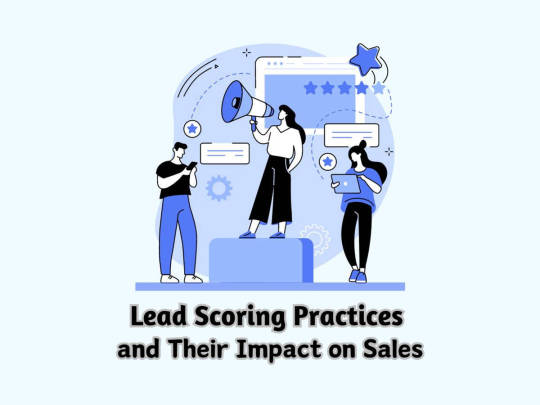
In the competitive landscape of sales and marketing, identifying and prioritizing high-quality leads is paramount to driving revenue and achieving business objectives. Lead scoring, a methodology used to rank prospects based on their likelihood to convert, plays a crucial role in streamlining the sales process and maximizing efficiency. In this article, we'll delve into case studies showcasing successful lead scoring practices and their tangible impact on sales performance.
Case Study 1: Company X Increases Conversion Rates by 30%
Company X, a software-as-a-service (SaaS) provider, implemented a lead scoring system to better qualify and prioritize leads for their sales team. By analyzing data from their customer relationship management (CRM) system, website interactions, and email engagement metrics, they identified key criteria indicative of a high-quality lead, including job title, company size, website visits, and content downloads.
By assigning scores to each lead based on these criteria, Company X was able to focus their sales efforts on prospects with the highest propensity to convert. As a result, they saw a 30% increase in conversion rates, with the sales team spending less time chasing low-quality leads and more time closing deals with qualified prospects. Lead scoring improved alignment between sales and marketing teams, fostering collaboration to define criteria and refine the model effectively.
Case Study 2: Company Y Shortens Sales Cycle and Increases Revenue
Company Y, a B2B technology provider, faced challenges with a lengthy sales cycle and inconsistent lead follow-up processes. To address these issues, they implemented a lead scoring system integrated with their CRM platform. Company Y developed a scoring model by leveraging data from various sources, prioritizing leads based on purchasing likelihood.
Automating lead scoring enabled Company Y to pinpoint hot leads for immediate follow-up by the sales team effectively. This streamlined approach significantly shortened the sales cycle, directing sales efforts toward high-converting prospects effectively. As a result, Company Y saw a notable increase in revenue, as well as improved sales efficiency and productivity.
Key Takeaways and Best Practices
Define Clear Criteria: Establish clear criteria for lead scoring based on both demographic and behavioral factors. This ensures consistency and alignment across sales and marketing teams.
Leverage Data Insights: Use data analytics to identify patterns and trends among high-converting leads. Continuously monitor and refine your scoring model based on real-time data insights.
Integrate with CRM: Integrate your lead scoring system with your CRM platform to ensure seamless leads management and follow-up processes. This enables sales reps to prioritize their efforts and focus on the most promising opportunities.
Collaborate Across Teams: Collaborate across sales, marketing, and relevant departments to define leads criteria and optimize scoring models effectively. Regular communication and feedback loops are essential for continuous improvement.
Conclusion
Effective lead scoring boosts sales performance, yielding higher conversions, shorter cycles, and increased revenue. Case studies like Company X and Y showcase how strategic lead methodologies drive transformative sales processes and tangible results. Define criteria, leverage data insights, integrate with CRM, foster collaboration to unlock lead scoring's potential for sustainable sales success.
0 notes
Text
Advantages of Zoho CRM Plus
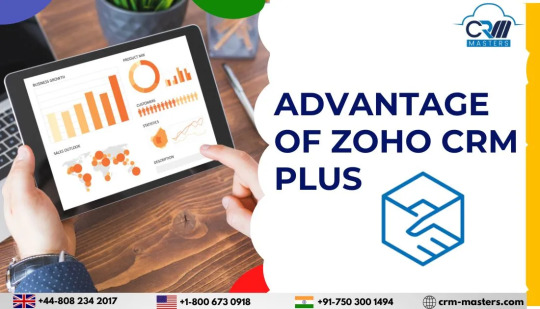
Businesses constantly seek solutions that streamline their processes and provide a holistic view of customer interactions. Zoho CRM Plus is a comprehensive suite of applications offered by Zoho Corporation, which emerges as a powerful ally in pursuing enhanced customer engagement and operational efficiency. Let’s learn the benefits of Zoho CRM Plus that make a strategic choice for businesses of all sizes.
What is Zoho CRM Plus
A unified CRM platform that seamlessly transfers customer information from one sales, marketing, and customer support team to another. Zoho CRM Plus is the solution to connect your sales, marketing, and customer support teams in one place.
Whether you’re connecting with prospects, making deals, or providing support and keeping customers engaged throughout the entire customer lifecycle, Zoho’s CRM Plus solution is with you at every step. It also helps you solve complex administration issues that are inherent in siloed ecosystems and can require a significant amount of administrative effort. Zoho CRM Plus helps organizations reduce the barriers to providing the best possible customer experience.
The Zoho CRM Plus platform offers various services designed to meet customers’ needs from different angles, including sales, marketing, and support.
Advantages of Zoho CRM Plus
1. Close More Deals and Get More Business
With Zoho CRM Plus, you can integrate your website with other customer touchpoints, such as marketing campaigns, customer relationship management (CRM), and customer support. For example, you can push visitors you’ve had positive conversations with as leads to your CRM with all the information about their visit to your site intact.
2. Convert your website visitors to subscribers for your email campaign with signup forms in Campaigns:-
Your business website receives thousands of visitors daily. However, only some first-time visitors are ready to convert into customers. This is an essential category of visitors who are more likely to convert if you nurture them through email campaigns that explain your business offerings.
Zoho CRM Plus campaigns include sign-up forms you can embed on your website’s subscription page to allow those visitors to register for more information. Once those visitors complete the sign-up form, they’ll be added to your Campaigns as subscribers, and you’ll send them newsletters and other marketing messages regularly.
3. Increase the productivity of your sales teams:-
Sales reps are responsible for daily follow-ups, lead assigning, and customers’ voicemail emails. Zoho CRM Plus saves your sales team time on tedious manual tasks daily.
4. Automate Your Sales Activities with Workflow Rules:-
With the help of Zoho CRM Plus, you can automate your sales processes, including emailing, task management, and field updates with CRM workflow rules.
5. Improve your social media presence:-
Zoho CRM plus platform for businesses allows you to manage a wide range of social media channels, from Facebook and Twitter to Instagram and LinkedIn, as well as Google My Business (GMB).
6. Automate end-to-end support processes with Blueprint
You can create and streamline sales, marketing, and support processes with the help of Zoho’s CRM plus Blueprint.
7. Create Online Surveys and Questionnaires using surveys
Customer feedback is one of the most critical aspects of the customer life cycle. Knowing how your business stacks up against customer expectations and understanding what customers enjoy and what they would like you to do differently is critical.
Zoho CRM Plus surveys are designed to collect this feedback in a targeted and effective way. You can easily set up surveys for:
.Data Collection
.NPS
.Customer Feedback
.Business Reach
.Upselling Opportunities
.Customer Retention
8. Get a Comprehensive picture of Your business with analytics
Businesses want to know what works for them and what doesn’t so they can improve as they go. Zoho CRM Plus offers comprehensive analytics for your sales marketing and support functions. You can also get reports that integrate all three functions.
9. Marketing Analytics
Zoho CRM Plus provides analytics on your social media efforts with metrics such as audience size, post engagement, performance, audience reach, and impressions.
10. Unified Business Analytics
Zoho CRM Plus not only allows you to view specific dashboards for sales, support, and marketing, but it also allows you to integrate data across applications like CRM, Desk, and Social and present critical information in any of 300+ pre-designed templates that can be tailored to highlight key performance indicators.
Conclusion
If you’re a business looking to take your customer relationship management (CRM) strategy to the next level, you’ve come to the right place. Zoho CRM Plus is a powerful, all-in-one solution that unifies different business functions into one platform, provides a 360-degree customer view, and offers powerful automation and analytics capabilities. With all these features, you’ll be able to meet and exceed your customers’ expectations. This suite is essential for unlocking operational efficiencies and driving long-term business success in today’s ever-changing customer engagement environment.
Want to Implement CRM Plus for your Business Success?
CRM Master’s Infotech is a Zoho Implementation Partner that provides top-notch customer experiences to their clients while providing a seamless user experience.
Source: https://crm-masters.com/advantages-of-zoho-crm-plus/
0 notes
Text
SALESFORCE SNOWFLAKE

Salesforce + Snowflake: A Data Powerhouse for Customer Insights
In today’s data-driven world, having the right tools to collect, manage, and analyze customer information is critical for business success. Salesforce, as a leading CRM platform, and Snowflake, with its powerful data cloud capabilities, offer a compelling combination to create a robust data foundation, driving deeper customer insights and informed decision-making.
Why Salesforce and Snowflake?
Salesforce: The Customer Engagement Engine
Salesforce is renowned for its ability to capture and manage rich customer data across sales, marketing, service, and other touchpoints. It houses information about customer interactions, preferences, purchase history, and support cases.
Snowflake: The Scalable Data Cloud
Snowflake stands out as a highly scalable, cloud-based data warehouse. It can seamlessly handle massive volumes of data from various sources, ensuring your customer insights aren’t limited by storage or processing capabilities.
The Benefits of a Salesforce-Snowflake Integration
Centralized Customer Data: Integrating Salesforce with Snowflake creates a unified repository for all your customer data. This breaks down data silos, providing a 360-degree view of your customers.
Advanced Analytics at Scale: Snowflake’s processing power allows you to run complex queries and analyze vast datasets that would otherwise challenge traditional data systems. You can unlock deeper patterns and trends within your customer behavior.
Real-Time Insights: The seamless data flow between Salesforce and Snowflake enables near-real-time data updates. This empowers your teams with the latest customer information to make timely, data-informed decisions.
Enhanced Personalization: Armed with a comprehensive picture of your customers, you can hyper-personalize marketing campaigns, communications, and product recommendations, leading to stronger customer relationships.
Data Democratization: Snowflake empowers both technical and non-technical users to explore data. Business analysts, marketers, and customer service reps can independently access and visualize data, leading to faster insights.
Use Cases
Customer Segmentation: Analyze integrated data for detailed behavioral segmentation and targeted marketing.
Predictive Modeling: Leverage historical data in Snowflake to build predictive models within Salesforce, forecasting churn, sales potential, or support ticket likelihood.
Operational Efficiency: Create comprehensive dashboards using Snowflake data to monitor sales pipelines, support case activity, and marketing campaign performance within Salesforce.
Getting Started
Salesforce and Snowflake offer native connectors and integrations, facilitating a smooth connection process. Consider these key aspects:
Data Governance: Establish clear data ownership, access controls, and security protocols.
Data Modeling: Design a data model within Snowflake that effectively addresses your analytics needs.
Data Loading: Choose between batch loading or near real-time data replication based on your required frequency of updates.
The Future is Data-Driven
The synergy between Salesforce and Snowflake establishes a scalable, future-proof foundation for data-driven customer experiences. Leveraging these powerful platforms allows you to gain the agility and insights necessary to stay ahead of the curve.
youtube
You can find more information about Snowflake in this Snowflake
Conclusion:
Unogeeks is the No.1 IT Training Institute for SAP Training. Anyone Disagree? Please drop in a comment
You can check out our other latest blogs on Snowflake here – Snowflake Blogs
You can check out our Best In Class Snowflake Details here – Snowflake Training
Follow & Connect with us:
———————————-
For Training inquiries:
Call/Whatsapp: +91 73960 33555
Mail us at: [email protected]
Our Website ➜ https://unogeeks.com
Follow us:
Instagram: https://www.instagram.com/unogeeks
Facebook: https://www.facebook.com/UnogeeksSoftwareTrainingInstitute
Twitter: https://twitter.com/unogeeks
0 notes
Text
Sales Performance Management in Business Growth
Sales Performance Management (SPM) plays a pivotal role in driving business growth by aligning sales strategies, motivating sales teams, and optimizing sales processes. In today's highly competitive business landscape, where customer expectations are constantly evolving, and markets are rapidly changing, effective sales performance management is more critical than ever. It not only ensures that sales targets are met but also fosters a culture of continuous improvement and innovation within an organization. Here's a deeper dive into the role of Sales Performance Management in fostering business growth:
Setting Clear Objectives and Targets: One of the primary functions of SPM is to establish clear and achievable sales objectives and targets. These objectives should be aligned with the overall business goals and strategies. By setting specific, measurable, attainable, relevant, and time-bound (SMART) goals, SPM provides sales teams with a clear direction and purpose. This clarity enables sales representatives to focus their efforts on activities that drive revenue growth and customer satisfaction.
Performance Monitoring and Evaluation: SPM involves continuous monitoring and evaluation of sales performance against predefined metrics and benchmarks. Through the use of key performance indicators (KPIs) such as sales revenue, conversion rates, customer acquisition costs, and sales cycle length, organizations can assess the effectiveness of their sales strategies and identify areas for improvement. Real-time analytics and reporting tools enable sales managers to track individual and team performance, identify top performers, and address performance gaps promptly.
Incentive Compensation Management: Effective incentive compensation management is a crucial aspect of SPM. By aligning compensation plans with sales objectives and performance metrics, organizations can incentivize desired behaviors and outcomes. Variable compensation structures, such as commissions, bonuses, and sales contests, motivate sales teams to exceed targets and drive revenue growth. Moreover, transparent and fair compensation practices enhance employee satisfaction and retention, leading to a more engaged and productive sales force.
Sales Training and Development: SPM encompasses ongoing training and development initiatives to enhance the skills and competencies of sales professionals. By providing comprehensive product training, sales methodology workshops, and coaching sessions, organizations can empower sales reps to effectively communicate value propositions, overcome objections, and close deals. Investing in the professional development of sales teams not only improves sales performance in the short term but also strengthens the organization's capabilities to adapt to market changes and seize new opportunities in the long run.
Sales Process Optimization: SPM involves the continuous optimization of sales processes to improve efficiency, effectiveness, and customer satisfaction. By leveraging technology solutions such as customer relationship management (CRM) systems, sales automation tools, and predictive analytics, organizations can streamline lead management, sales forecasting, and territory planning processes. Automation reduces administrative burdens on sales reps, allowing them to focus more time and energy on revenue-generating activities. Furthermore, data-driven insights enable sales managers to identify bottlenecks, eliminate inefficiencies, and implement best practices across the sales organization.
Performance Feedback and Recognition: SPM fosters a culture of performance feedback and recognition, where achievements are celebrated, and constructive feedback is provided to support continuous improvement. Regular performance reviews, one-on-one coaching sessions, and team meetings enable sales managers to provide personalized feedback, acknowledge accomplishments, and identify development opportunities. Recognizing and rewarding top performers not only boosts morale and motivation but also sets a positive example for others to emulate, driving overall sales performance and business growth.
In conclusion, Sales Performance Management plays a multifaceted role in driving business growth by aligning sales strategies, motivating sales teams, and optimizing sales processes. By setting clear objectives, monitoring performance, incentivizing desired behaviors, investing in training and development, optimizing processes, and providing feedback and recognition, organizations can maximize the effectiveness and productivity of their sales operations. In today's dynamic business environment, SPM is not just a function but a strategic imperative for organizations seeking sustainable growth and competitive advantage.
0 notes
Text
Streamlining Team Efforts: A Guide to Sales Enablement and Collaboration
How Sales Enablement Platforms Assist Collaboration
In the world of sales, teamwork isn't just a buzzword – it's the backbone of success. Yet, coordinating efforts across diverse teams, locations, and time zones can be a daunting challenge. This is where Sales Enablement Platforms step in as the ultimate team enabler. In this comprehensive guide, we'll uncover how these platforms revolutionize collaboration, empowering sales teams to achieve greatness together.
Understanding Sales Enablement Platforms
Before diving into the collaborative wonders of Sales Enablement Platforms, let's grasp the basics. A Sales Enablement Platform is like a Swiss Army knife for sales teams. It's a centralized digital hub where sales content, tools, training, and insights come together, empowering reps to sell smarter and faster.
Download the sample report of Market Share: https://quadrant-solutions.com/download-form/market-research/market-forecast-sales-enablement-platform-2022-2027-worldwide-2192
Breaking Down Silos
In many organizations, sales, marketing, and other departments often operate in silos, leading to miscommunication and inefficiency. Sales Enablement Platforms break down these barriers by providing a single source of truth for all sales-related activities. Marketing can align content with sales needs, while sales can provide valuable feedback on what resonates with customers. This seamless collaboration ensures that everyone is on the same page, working towards common goals.
Real-Time Collaboration
Gone are the days of endless email chains and missed messages. Sales Enablement Platforms offer real-time collaboration features that enable teams to communicate effortlessly. Whether it's sharing feedback on a new sales presentation, brainstorming ideas for an upcoming campaign, or discussing customer insights, teams can collaborate instantly from anywhere in the world. This real-time connectivity fosters a sense of camaraderie and keeps everyone aligned and informed.
Centralized Content Management
Imagine having all your sales collateral, from pitch decks to case studies, stored in one easily accessible location. That's the power of centralized content management offered by Sales Enablement Platforms. Sales reps no longer waste time searching for the right materials or, worse, using outdated content. With everything organized and tagged intuitively, reps can quickly find the assets they need, ensuring consistency and accuracy across all customer interactions.
Seamless Integration with Existing Tools
Sales Enablement Platforms integrate seamlessly with existing tools and systems, such as Customer Relationship Management (CRM) software and email clients. This integration eliminates the need for manual data entry and ensures that all sales activities are logged and tracked automatically. Sales reps can spend less time on administrative tasks and more time engaging with customers and closing deals.
Download the sample report of Market Forecast: https://quadrant-solutions.com/download-form/market-research/market-forecast-sales-enablement-platform-2022-2027-worldwide-2192
Enhanced Training and Onboarding
Effective collaboration begins with proper training and onboarding. Sales Enablement Platforms provide comprehensive training modules and on-demand resources that empower reps to hit the ground running. New hires can access training materials, product information, and best practices anytime, anywhere, ensuring a smooth transition into their roles. Additionally, ongoing training sessions and coaching help reps stay updated on the latest sales techniques and industry trends, fostering continuous improvement and growth.
Driving Accountability and Transparency
With Sales Enablement Platforms, accountability becomes ingrained in the sales process. Managers can track rep activities, monitor performance metrics, and provide timely feedback through built-in analytics and reporting tools. This transparency not only keeps reps accountable for their actions but also enables managers to identify areas for improvement and provide targeted support where needed.
Why Market Reports?
Market reports are a great source of valuable and trustworthy data that answers all your doubts regarding your business, or the domain you are dealing with. Not only do they help you save time, but also add credibility to your work when you present your research to clients, make changes to your existing business plan, or develop business plans for future purposes.
Quadrant Knowledge Solutions is one such organization that delivers data-backed research with thorough analysis. Their reports not only offer valuable information and data-driven analysis that shapes industry trends but also help businesses make better strategic decisions. By leveraging these reports, businesses can navigate the evolving industry landscape, seize opportunities, and stay competitive.
Talk To Analyst: https://quadrant-solutions.com/talk-to-analyst
Why Quadrant Knowledge Solutions?
Quadrant Knowledge Solutions stands out as a reputable source for market intelligence, particularly in the realm of Sales Enablement Platforms. Here are key reasons why companies should consider their reports:
Expertise and Credibility
Quadrant Knowledge Solutions is recognized for its expertise in market research and analysis. Their reports are crafted by industry experts, ensuring a high level of credibility and reliability in the information provided.
Comprehensive Coverage
The reports from Quadrant Knowledge Solutions offer a thorough analysis of the SEP market. This includes market share data, growth forecasts, and insights into key market trends, providing a holistic understanding of the industry landscape.
Timely and Relevant Information
In the fast-paced world of cybersecurity, timely information is crucial. Quadrant Knowledge Solutions consistently delivers reports that reflect the latest market developments, ensuring that companies have access to up-to-date and relevant insights.
Decision Support for Businesses
Quadrant Knowledge Solutions reports go beyond providing data; they offer actionable insights and recommendations. This decision support is invaluable for businesses navigating the complexities of SEP implementation and strategy development.
Conclusion
In today's fast-paced sales environment, collaboration is non-negotiable. Sales Enablement Platforms serve as catalysts for collaboration, bringing teams together, breaking down silos, and empowering reps to work smarter, not harder. By providing centralized access to content, fostering real-time communication, and integrating seamlessly with existing tools, these platforms revolutionize the way sales teams collaborate, ultimately driving success and growth.
0 notes
Text
Revolutionizing Sales Training with Microlearning LMS: Strategies for Success

Introduction:
In the dynamic world of sales, continuous learning and skill development are essential for success. Traditional training methods often fall short in meeting the evolving needs of sales professionals, who require timely, relevant, and easily accessible resources to stay competitive in today's market. This is where microlearning, coupled with a Learning Management System (LMS), emerges as a game-changer. By leveraging the power of microlearning within an LMS tailored for sales training, organizations can deliver personalized, on-demand learning experiences that drive performance improvement and maximize sales effectiveness. In this article, we delve into the benefits, strategies, and best practices for implementing a microlearning LMS for sales training.
The Rise of Microlearning in Sales Training:
Microlearning has gained widespread popularity in the realm of corporate training, and for good reason. Unlike traditional lengthy training sessions, microlearning delivers content in small, focused nuggets that are easy to digest and retain. This approach aligns perfectly with the fast-paced nature of the sales profession, where time is of the essence, and information overload is a common challenge.
In sales training, microlearning offers several advantages:
Just-in-Time Learning: Sales professionals often encounter specific challenges or questions while engaging with clients or prospects. Microlearning enables them to access relevant training content precisely when they need it, allowing for immediate application in real-world scenarios.
Bite-sized Content: Microlearning modules are typically brief, targeted, and focused on a single learning objective. This format facilitates better information retention and reduces cognitive overload, ensuring that sales reps can quickly grasp key concepts and skills.
Mobile Compatibility: Sales professionals are frequently on the go, making mobile accessibility a crucial aspect of effective training. Microlearning content delivered through an LMS can be accessed anytime, anywhere, via smartphones or tablets, enabling seamless learning on the fly.
Personalization: A microlearning LMS can leverage data analytics and user feedback to deliver personalized learning experiences tailored to each salesperson's needs, preferences, and performance metrics. This targeted approach enhances engagement and motivation, driving continuous improvement.
Implementing a Microlearning LMS for Sales Training:
To harness the full potential of a microlearning LMS for sales training, organizations must adopt a strategic approach. Here are some key steps and considerations:
Content Curation and Creation:
Identify High-Impact Topics: Determine the critical knowledge areas, skills, and competencies that are essential for sales success. Focus on topics such as product knowledge, sales techniques, objection handling, negotiation skills, and customer relationship management.
Curate Relevant Resources: Gather existing training materials, such as videos, articles, case studies, simulations, and interactive modules, that align with the identified learning objectives. Additionally, consider partnering with subject matter experts or industry professionals to create fresh, engaging content specifically tailored to your sales team's needs.
Modularize Content: Break down larger training modules into smaller, self-contained microlearning units that address specific learning objectives or scenarios. Each module should be concise, interactive, and designed to facilitate active engagement and knowledge retention.
Technology Integration and Platform Customization:
Select the Right LMS: Choose an LMS platform that is flexible, user-friendly, and equipped with robust microlearning capabilities. Look for features such as mobile optimization, content authoring tools, analytics dashboards, and integration with existing CRM systems or sales software.
Customize the User Experience: Design the LMS interface to reflect your organization's branding and culture while prioritizing ease of navigation and accessibility. Implement features such as gamification elements, progress tracking, and social learning functionalities to enhance engagement and motivation among sales reps.
Deployment and Training:
Launch Pilot Programs: Before rolling out the microlearning LMS to the entire sales team, conduct pilot programs or beta testing with a small group of representatives. Gather feedback, identify areas for improvement, and refine the content and user experience based on real-world usage and performance data.
Provide Comprehensive Training: Offer comprehensive training and support resources to help sales reps navigate the microlearning platform effectively. This may include tutorials, user guides, webinars, and one-on-one coaching sessions to ensure that all team members can maximize the benefits of the new training system.
Continuous Evaluation and Optimization:
Monitor Performance Metrics: Use the built-in analytics tools within the LMS to track learner engagement, completion rates, quiz scores, and other relevant metrics. Analyze this data to identify trends, patterns, and areas of improvement, and adjust the training content and delivery methods accordingly.
Iterate and Improve: Continuously iterate and refine the microlearning content based on feedback from sales reps, managers, and other stakeholders. Solicit input from top performers to identify best practices and success stories that can be shared with the wider team. Additionally, stay abreast of industry trends and evolving customer needs to ensure that training content remains relevant and up-to-date.
Conclusion:
In an era defined by rapid technological advancements and evolving customer expectations, sales organizations must adapt their training strategies to empower their teams with the knowledge and skills needed to succeed. By embracing microlearning principles within a dedicated LMS platform, companies can deliver personalized, on-demand training experiences that resonate with modern sales professionals. From improving product knowledge to honing sales techniques and enhancing customer interactions, a well-executed microlearning LMS for sales training holds the key to unlocking the full potential of your sales force and driving business growth in today's competitive marketplace.
#Personalization of Learning#Microlearning Platform#Spaced Repetition#Adaptive Learning#Microlearning Courses#AI powered tool#Microlearning Platforms#compliance microlearning#dde framework#Adaptive microlearning#microlearning lms#ebbinghaus learning curve#AI powered authoring tool#gamification of learning#risk-focused training#Risk-Specific Training#compliance training#micro learning#adaptive learning#ai for training#learning personalization#microlearning platforms#ai lms#adaptive learning platforms#gamified lms#lms with gamification#lms with ai#adaptive learning software#adaptive learning technology#gamified learning management system
0 notes
Text
Mobile-friendly CRM Software for Sales Reps in Delhi-NCR
Mobile-friendly >> CRM Software for Sales Reps in Delhi-NCR
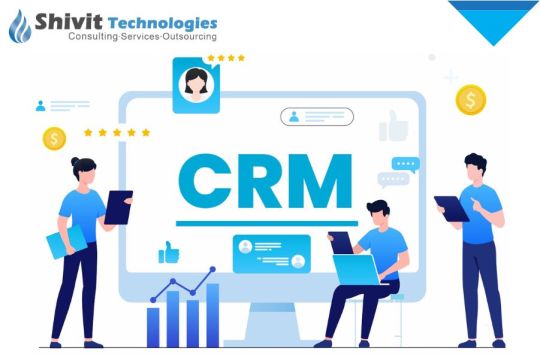
In the dynamic landscape of small businesses in 2024, finding the best CRM software that caters to your unique needs is crucial. Look no further than Shivit - the ultimate CRM solution designed specifically for small businesses. With a focus on affordability, seamless email integration, and user-friendly interface, Shivit stands out as the go-to choice for entrepreneurs looking to elevate their customer management strategies.
User-friendly CRM software for startups and affordability is paramount for small businesses, Shivit understands this need. As the best CRM software for small businesses in 2024, Shivit offers competitive pricing plans to suit your budget constraints without compromising on functionality. Say goodbye to huge upfront costs and hidden fees – with Shivit, you get a comprehensive CRM solution that won't break the bank.
Email integration is essential for effective communication with customers, and Shivit excels in this aspect. Seamlessly sync your email accounts with Shivit to centralize all customer interactions in one convenient platform. Whether you're sending personalized marketing emails or responding to customer inquiries, Shivit ensures that no communication falls through the cracks, allowing you to nurture relationships with ease.
Real estate agents require specialized CRM tools to manage their extensive client base and property listings efficiently. Shivit understands the unique needs of real estate professionals and offers tailored features to streamline their workflows. From property management and lead tracking to automated follow-ups, Shivit equips real estate agents with the tools they need to close more deals and grow their businesses.
Startups need a CRM solution that is intuitive and easy to use, and Shivit delivers on this front. With its user-friendly interface and straightforward setup process, Shivit is the perfect CRM software for startups looking to hit the ground running. Say goodbye to steep learning curves and complex configurations – with Shivit, you can start managing your customer relationships effectively from day one.
In conclusion, Shivit emerged as the ultimate CRM solution for small businesses in 2024, offering affordability, email integration, industry-specific customization, and advanced features tailored to your needs. Whether you're a startup looking to streamline your processes or a real estate agent seeking specialized tools, Shivit has you covered. With its intuitive interface, cloud-based infrastructure, and seamless social media integration, Shivit empowers businesses to cultivate meaningful customer relationships and drive growth in today's competitive landscape.
0 notes
Text
Data-Driven Decisions: Harnessing Insights from HubSpot CRM Integrations for Business��Success
In today’s fast-paced digital landscape, businesses thrive on data-driven decisions. The ability to gather, analyze, and leverage insights from various sources is crucial for staying competitive and achieving sustainable growth. Among the myriad of tools available to businesses, HubSpot CRM stands out as a powerful platform for managing customer relationships. When coupled with HubSpot integrations and sync capabilities, it becomes an indispensable asset for businesses aiming to unlock the full potential of their data.
The Power of HubSpot Integrations
HubSpot offers a wide array of integrations with other software solutions, allowing businesses to streamline their operations and gain deeper insights into their customers’ behavior. These integrations enable seamless data flow between different systems, eliminating silos and empowering businesses to make more informed decisions.
From marketing automation and customer service to sales enablement and analytics, HubSpot integrations cover a broad spectrum of functionalities. For example, integrating HubSpot CRM with email marketing platforms like Mailchimp or Constant Contact enables businesses to track email interactions and engagement metrics directly within the CRM. Similarly, integrations with e-commerce platforms such as Shopify or WooCommerce provide valuable insights into customer purchase history and trends, facilitating targeted marketing campaigns and personalized customer experiences.
Leveraging HubSpot Sync for Enhanced Efficiency
In addition to integrations, HubSpot offers robust sync capabilities that ensure data consistency and accuracy across different systems. HubSpot sync allows businesses to synchronize data between HubSpot CRM and other tools in real-time, ensuring that all team members have access to the latest information and insights.
For sales teams, HubSpot sync eliminates the need for manual data entry by automatically updating contact records, deals, and interactions across platforms. This not only saves time but also reduces the risk of errors and inconsistencies, allowing sales reps to focus on what they do best – closing deals.
Similarly, marketing teams can leverage HubSpot sync to align their efforts with sales objectives and track the effectiveness of their campaigns. By syncing data between HubSpot CRM and marketing automation platforms, marketers can gain a holistic view of the customer journey and identify opportunities for optimization and improvement.
Driving Business Success with Data-Driven Decisions
By harnessing insights from HubSpot CRM integrations and sync capabilities, businesses can make data-driven decisions that drive success across all aspects of their operations. Whether it’s identifying new market opportunities, optimizing sales processes, or enhancing customer experiences, access to timely and accurate data is key to staying ahead of the competition.
For example, a company may use data from HubSpot CRM integrations to identify trends in customer behavior and preferences, allowing them to tailor their marketing messages and product offerings accordingly. By analyzing data on customer interactions and engagement metrics, businesses can also identify areas for improvement and implement targeted strategies to increase customer satisfaction and loyalty.
Furthermore, data-driven decision-making enables businesses to track their progress towards key performance indicators (KPIs) and make adjustments in real-time to ensure they stay on course to achieve their goals. Whether it’s adjusting marketing spend based on ROI metrics or reallocating resources to focus on high-value opportunities, access to timely and actionable insights empowers businesses to adapt and thrive in an ever-changing marketplace.
Conclusion
In conclusion, data-driven decisions are essential for businesses looking to achieve sustainable growth and success. By harnessing insights from HubSpot CRM integrations and sync capabilities, businesses can unlock the full potential of their data and make informed decisions that drive results.
Whether it’s streamlining operations, optimizing marketing campaigns, or enhancing customer experiences, access to timely and accurate data is crucial for staying competitive in today’s digital landscape. By leveraging the power of HubSpot integrations and sync, businesses can gain a holistic view of their customers and operations, empowering them to make smarter decisions and achieve their business objectives.
#crm#crm software#erpsoftware#automation services#b2b saas#business growth#integration#saas#businessintelligence#hubspot integration#hubspot#hubspot crm#saas software
0 notes
Text
Grow Your Business: Harness Insights with CRM Sales Management
In today's competitive market, growing your business requires strategic insights and efficient sales management. CRM (Customer Relationship Management) sales management offers a solution by providing valuable insights and streamlining sales processes. This article explores how harnessing insights with CRM can fuel business growth and highlights the best CRM software solutions for achieving your growth objectives.
Introduction
As businesses strive to expand their market presence and drive revenue growth, harnessing insights becomes crucial for making informed decisions and staying ahead of the competition. CRM sales management serves as a catalyst for business growth by centralizing customer data, tracking sales activities, and providing actionable insights. By leveraging CRM software, businesses can unlock valuable insights that drive strategic growth initiatives.
Importance of CRM Sales Management
CRM sales management is instrumental in driving business growth by:
Centralizing Customer Data: CRM software consolidates customer information, enabling businesses to gain a holistic view of customer interactions, preferences, and behaviors.
Analyzing Sales Performance: By tracking sales activities and analyzing performance metrics, CRM provides valuable insights into sales trends, pipeline health, and revenue forecasts.
Improving Decision-Making: With access to real-time data and analytics, businesses can make data-driven decisions, identify growth opportunities, and optimize sales strategies for maximum impact.
Understanding CRM
Definition of CRM
CRM, or Customer Relationship Management, refers to software and strategies designed to manage and analyze customer interactions throughout the customer lifecycle. From lead generation and prospecting to post-sale support and retention, CRM helps businesses build and nurture relationships with customers, driving long-term loyalty and revenue growth.
Best CRM Software
When selecting the best CRM software for your business, consider the following options:
Best CRM Software: Explore leading CRM solutions such as Salesforce, HubSpot, and Zoho CRM, known for their robust features, scalability, and integration capabilities.
Best CRM Software in India: For businesses operating in the Indian market, consider tailored CRM platforms like Freshsales and Agile CRM, designed to meet the unique needs of Indian businesses.
Lead Management CRM Software: Optimize lead management with CRM solutions like Pipedrive and Copper CRM, offering advanced lead tracking, scoring, and nurturing capabilities.
CRM Sales Tracking Software
Effective sales tracking is essential for monitoring sales activities, identifying trends, and forecasting revenue. Look for CRM software with comprehensive sales tracking features, such as Insightly and Nimble, which provide real-time insights into sales performance and pipeline health.
Implementing CRM
Sales Management Platform
A comprehensive sales management platform combines CRM functionality with additional features to support sales operations, including:
Online Sales Management Software: Integrate CRM with e-commerce platforms like Shopify and WooCommerce to streamline online sales processes, manage orders, and track customer interactions.
Employee Task Management Software: Enhance team collaboration and productivity with CRM-integrated task management tools like Asana and Trello, enabling sales reps to prioritize tasks, track progress, and meet deadlines effectively.
Best Practices
To maximize the benefits of CRM sales management, consider implementing the following best practices:
Regular Data Maintenance: Ensure data accuracy and integrity by regularly updating and cleansing customer information in the CRM system to avoid duplicates and inaccuracies.
Customization for Sales Processes: Tailor CRM workflows and dashboards to align with your specific sales processes and objectives, ensuring optimal usability and adoption.
Utilizing Mobile CRM: Empower sales reps with mobile access to CRM data, enabling them to stay productive on-the-go, respond to customer inquiries promptly, and access critical sales information anytime, anywhere.
Challenges and Solutions
Overcoming Implementation Hurdles
While implementing CRM can lead to significant business growth, businesses may encounter challenges such as:
Resistance to Adoption: Address resistance through comprehensive training, clear communication of benefits, and ongoing support to ensure user acceptance and engagement.
Data Security Concerns: Implement robust data security measures, including encryption and access controls, to protect sensitive customer information and build trust with stakeholders.
Conclusion
In conclusion, harnessing insights with CRM sales management is essential for driving business growth and staying competitive in today's market. By centralizing customer data, analyzing sales performance, and optimizing sales processes, businesses can unlock valuable insights that fuel strategic growth initiatives and propel them towards success. Whether it's optimizing lead management, tracking sales activities, or empowering sales teams with mobile access, CRM offers endless possibilities for business growth and expansion.
FAQs
How does CRM sales management contribute to business growth? CRM sales management centralizes customer data, analyzes sales performance, and provides actionable insights, driving strategic growth initiatives and revenue expansion for businesses.
What factors should businesses consider when selecting CRM software? Businesses should consider factors such as scalability, customization options, integration capabilities, user-friendliness, and alignment with specific sales processes and objectives.
What are the key features of effective CRM software? Key features include contact management, sales tracking, automation, reporting and analytics, and integration with other business systems for a seamless customer experience.
How can businesses overcome resistance to CRM adoption? Businesses can overcome resistance through comprehensive training, clear communication of benefits, ongoing support, and incentives to encourage user acceptance and engagement.
What role does mobile CRM play in business growth? Mobile CRM empowers sales reps with access to real-time customer data, enabling them to stay productive on-the-go, respond to customer inquiries promptly, and access critical sales information anytime, anywhere.
0 notes
Text
Unlocking Business Potentiaonal
Dano Cloud Technology
In the dynamic landscape of modern business, technology serves as the cornerstone of innovation and progress. At Dano Cloud Technology, we are at the forefront of this revolution, empowering businesses to thrive in the digital age with our cutting-edge cloud solutions. With a commitment to excellence and a passion for driving transformation, we are dedicated to unlocking the full potential of businesses worldwide www.danocloudtechnology.com
Embracing the Power of Cloud Technology
Cloud technology has emerged as a game-changer for businesses, offering unparalleled flexibility, scalability, and efficiency. At Dano
Cloud Technology, we harness the power of the cloud to provide businesses with innovative solutions that streamline operations, enhance collaboration, and drive growth. Whether it’s cloud migration, infrastructure optimization, or custom application development, we tailor our solutions GGGmeetG the unique needs of each client, ensuring they stay ahead of the curve in today’s competitive
www.danocloudtechnology.com
Salesforce Consulting
Salesforce Consulting Services offered by our top Salesforce Consultants would support all your sales, marketing and customer service needs so you can concentrate more on the core activities of your business
Salesforce Customization
You’ll find it easier than ever to customize Your Salesforce Org as we customize Salesforce with integrations, re-engineer business processes, and even help develop custom apps specifically for you.
Salesforce Administration
You will find more value for your dollars by choosing Cloud Analogy’s team of experienced Salesforce Administrators. Discover how our CRM experts can help you optimize Salesforce Implementation through their in-depth knowledge of the domain.
Salesforce Integration
Save time by eliminating the manual and redundant processes associated with moving data and automating the data exchange with Salesforce. Help your reps save time and give managers better insights into rep activity.
Salesforce Platform
Access the best of Nonprofit Cloud, Sales Cloud, Service Cloud, Government Cloud, Financial Services Cloud, Manufacturing Cloud, Education Cloud, and Community Cloud by choosing our administration, and data migration services from the world’s most preferred Salesforce Development Company and Salesforce Implementation Partner.
Salesforce Implementation
Do you want to reap the advantages of Salesforce Implementation Services but lacking on resources? Have you been paying too much for too less? Improve customer interactions and customer journeys
0 notes
Text
Top 10 Reasons To Choose Salesforce For Your Business

The CRM market is growing, and so are CRM solutions. But it all makes it difficult for businesses to choose which CRM is appropriate to meet their business needs in the best way. Several SMEs and managers wonder if implementing a Salesforce CRM is worth the effort and expenses. So, to solve this dilemma, we’ve compiled a list of the top 10 reasons you should use Salesforce -
1. Easy to Use
Salesforce removes all the challenges associated with setting up a new system and makes it as easy to use as any other website you visit. You can log in from anywhere, collaborate with colleagues, and view customer data whenever possible.
2. Effortless Customization
Salesforce App Cloud lets you build your application or integrate apps from AppExchange using point-and-click tools. The customization features it provides make it possible to add more modules, shift workflows, or create sales strategies in minutes. Besides that, this software is flexible and adaptable to changes within your company as it grows.
3. Cloud-Based
The Salesforce cloud feature enables users to access information from one central location, providing a pioneered, secure, and sophisticated cloud infrastructure to easily access sales, marketing, support, and analytics data.
4. Efficient Reporting
The Salesforce cloud feature enables users to access information from one central location, providing a pioneered, secure, and sophisticated cloud infrastructure to easily access sales, marketing, support, and analytics data.
5. Multitenant Platform
A single platform and infrastructure benefit businesses of all sizes. Salesforce’s multitenant architecture ensures that the platform is continuously updated as the customer’s data is secure. This means you’re getting the latest features with automatic, seamless upgrades three times a year.
6. Integration Options
The Salesforce platform has an open API that is robust and well-documented, making virtually any Salesforce integration possible. Using this, you can map your business processes onto Salesforce more effectively and boost productivity by integrating apps like MailChimp, Google Cloud, Zendesk, and Dropbox.
7. AppExchange Ecosystem
Through AppExchange, Salesforce users can create apps or get access to thousands of ready-to-install solutions. This extends Salesforce’s role to many different companies and provides them with easy access to a wide variety of mobile-ready solutions, including Flows, Lightning Data, and Bolt Solutions with Salesforce Consulting Company.
8. Mobile CRM
Salesforce introduced the concept of mobile CRM at a relatively young age. This 360-degree platform allows you to manage your data wherever you go, as you just need a smartphone. It allows employees to connect with their customers quickly and easily with the Salesforce Mobile App.
9. Customer Success Platform
A customer success strategy is achieved with Salesforce, which allows you to unify different functions within your business to achieve customer success. Marketers and sales reps can use its system to track potential customers before they even become customers. Salesforce’s analytics services help you drive more sales and understand team performance. With tools such as Sales Cloud, Service Cloud, and Marketing Cloud, you can easily address the preferences of your consumers.
10. Extensive Ecosystem
The Salesforce Success Community enables Salesforce customers to interact with the company and find out more about its products and services. Salesforce has a robust ecosystem that includes partners, developers, and consumers. Their services provide companies with access to exceptional capabilities offered by developers. You can always count on their community to help your business succeed.
The Bottom Line!
We hope you have understood how Salesforce can be an effective tool for businesses to manage their customers and grow. Feel free to reach out to us if you need any assistance related to Salesforce, as we are the best Salesforce consulting partner in USA, UK, UAE & India. In addition to our commitment to excellence, we aim to provide you with the perfect CRM for your business.
Source: https://crm-masters.com/top-10-reasons-to-choose-salesforce-for-your-business/
0 notes